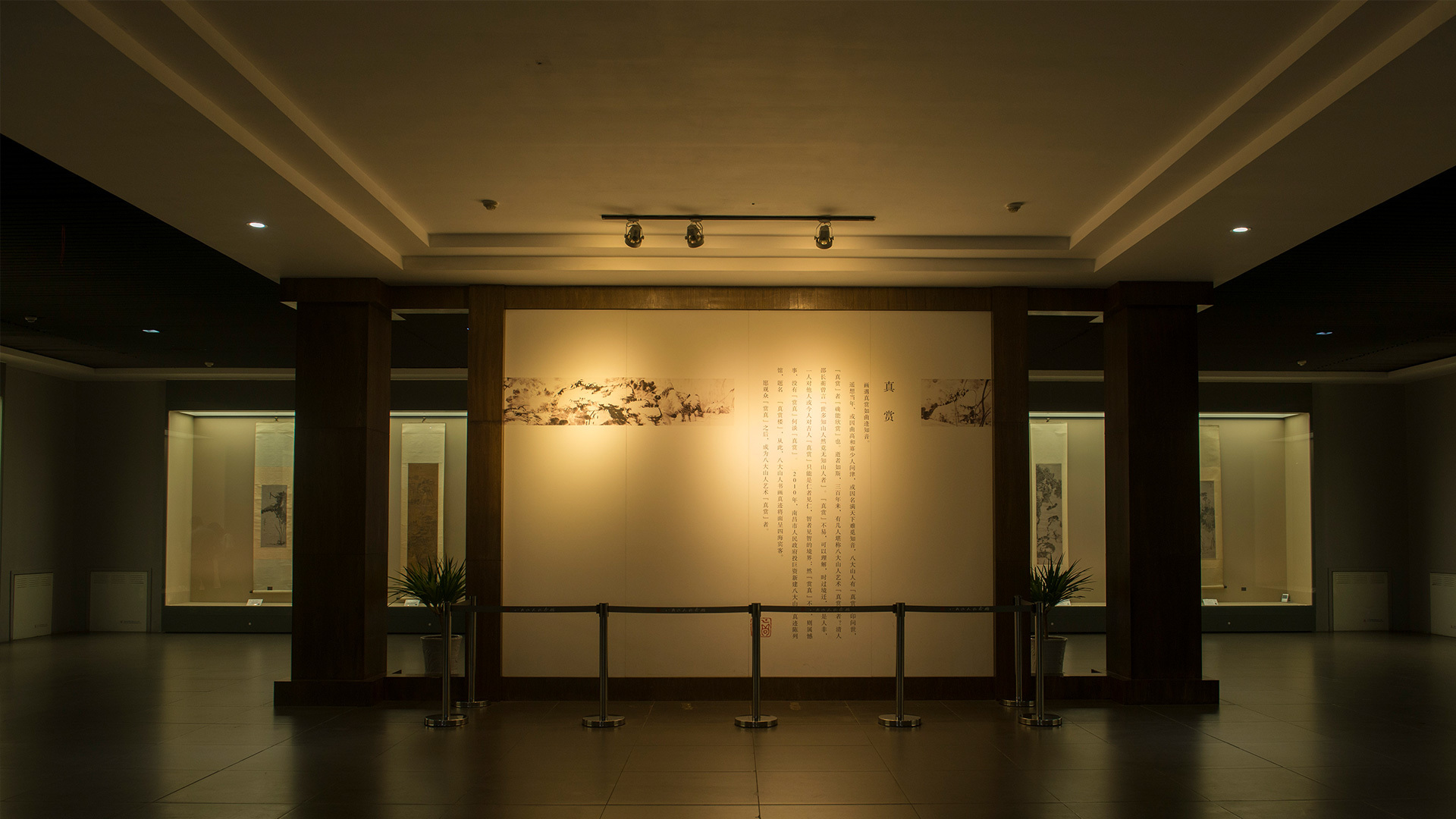About
Regulations of the Badashan Memorial Hall
Release time:
2020-06-01
Regulations of Bada Shanren Memorial Hall
Table of contents
preamble
Chapter 1 General Provisions
Chapter II Organizer
Chapter III Council
Chapter IV Board of Supervisors
Chapter V Management
Chapter VI Employees
Chapter VII Collection Display, Protection, Management, and Disposal
Chapter VIII Asset Management and Use
Chapter IX Information Disclosure
Chapter 10 Termination and Disposal of Remaining Assets
Chapter 11 Amendments to the Articles of Association
Chapter XII Supplementary Provisions
In October 1959, the Bada Shanren Memorial Hall was established in Qingyunpu Ancient Building . It is the first ancient painter memorial hall in China . In 2010, the Nanchang Municipal People's Government invested heavily in the expansion of the Bada Shanren Memorial Hall, adding two parts: the Original Works Hall and the Research Institute. After the expansion , the original area was increased from 15 acres to 40 acres . It is now a national second-level museum. It mainly displays the calligraphy and painting works of Bada Shanren and famous contemporary masters, including 36 pieces (sets) of authentic works of Bada Shanren . In 2004, it was rated as a patriotic education base in Jiangxi Province. In 2006 , it was announced by the State Council as a national key cultural relic protection unit .
Chapter 1 General Provisions
Article 1 In order to promote and guarantee the lawful operationandscientific development,standardize the various business operations of the museum, and ensurethe realization,according to the "Law of the People's Republic of China on the Protection ofand the " RegistrationProvisional Regulations, MuseumRegulationsand other relevant regulations to formulate this charter.
Article 2 The name of the museum isBada Shanren Memorial Hall.
The address of the museum is No. 259 , Qingyunpu Road, Qingyunpu District, Nanchang City .
URL: http://www.bdsrjng.cn .
Article 3 The organizer of the museum isthe Nanchang Municipal Bureau of Culture, Radio, Television, Press, Publication and Tourism, and the registration management agency is the Nanchang Municipal Public Institution Registration Administration .
Article 4 The source of funding for the museum isfull appropriation, and the start-up capital is4.37 million yuan.
Article 5 The museum is a non-profit institution with independent legal personality,enjoys and fulfills corresponding rights and obligations according to law, andindependently assumes legal responsibilities.
Article 6 The purpose of the museum is:
Collect and display cultural relics to promote national culture. Cultural relics collection, identification, registration, preservation, cultural relics exhibition, cultural relics reproduction and restoration, cultural relics and related research, cultural relics publicity and publication.
Article 7 The business scope of the museum is:
( 1) Collection, preservation, protection, and research of cultural relics, specimens, documents, and works of art;
( 2) Hold various exhibitions and carry out social education activities;
( 3) Dissemination and promotion of historical, scientific, cultural and artistic knowledge;
( 4) Other business scopes of the museum that comply with this Charter.
Chapter II Organizer
Article 8 The organizer's rights:
( 1) Propose the purpose and business scope of the museum;
( 2) Establish the first council of the museum;
( 3) Appoint relevant directors to the council of the museum;
( 4) Nominate and appoint and remove the curator and deputy curator; appoint and remove the person in charge of the party organization in accordance with relevant procedures;
( 5) To review the draft articles of association of the museum and the draft revision of the articles of association;
( 6) Approve the work report of the council of the museum;
( 7) Support the Council to perform its duties ;
( 8) Supervising the operation of the museum;
( 9) Fulfilling the responsibilities of the host unit specified in laws, regulations and other regulations.
Article 9 Obligations of the host unit:
( 1) Support the library to run the library independently in accordance with laws, regulations, rules and this constitution, and stop or eliminate acts that infringe or hinder the library from exercising its autonomy;
( 2) To provide the library with stable growth funds and related resources, and provide the necessary security conditions and necessary policy support for the library;
( 3) Safeguard the legitimate rights and interests of the library, support and guide the development of the library;
( 4) Other obligations stipulated by laws and regulations.
Chapter III Council
Section 1 Composition and Responsibilities of the Council
Article 10 The council is the decision-making and supervisory body of the museum, and the council reports to the host unit. The term of the councilis three years .
Article 11 There are 5members of the council of the museum2of the museum. The director and the person in charge of the party organization are ex officio members. Other representatives are nominated by the management of the museumorvoted by all the staff of the museum. The board of directors shall haveonesupervisoroneof whomshall concurrently serve as a supervisor to supervise and inspect the daily operation of the board of directors. At the same time,2 teachers near the location will be recruited into the council.
Article 12 Basic duties of the Council:
( 1) To ensure the continuity of the mission, scope and purpose of the museum ;
( 2) Encourage the public to actively participate in various business activities of the museum;
( 3) Provide corresponding support according to the purpose and business scope of the museum to ensure the current and future safety and maintenance of collections and cultural relics;
( 4) To ensure that the museum can serve the public as widely as possible;
( 5) Support museums to objectively and accurately interpret and disseminate knowledge about collections and cultural relics through research;
( 6) Supervise and approve various systems and supervise the implementation of these systems in accordance with the purpose and scope of business of the museum;
( 7) Review the medium and long-term development plan of the museum, review and approve the museum's goals and realization methods, and supervise the implementation of the museum plan;
( 8) To ensure the financial stability of the museum budget expenditures and raising funds;
( 9) Elect the chairman and vice-chairman, review the candidates for the director and deputy director , and evaluate the work of the management;
(10) Ensure that the museum has sufficient personnel to carry out various functions ;
(11) To review the internal salary distribution plan of the library, and the plan for setting up internal and branch offices ;
(12) To form the next council three months before the expiration of the term of the current council , and report to the organizer for review;
(13) Fulfill the duties of the board of directors specified in laws, regulations and other regulations.
Article 13 The Council submits annual work reports and special reports on majorIf the resolutions passed by the council must be reported to the relevant departments for approval or filing according to the management authority, they shall be reported to the relevant departments for approval or filing.
Article 14 The first session of the council is organized by the host unit; when the council is re-elected, it will be jointly organized by the host unit and the current session of the council, and the newsessionof directors will be elected according to procedures.
Section 2 Director
Article 15 The term of office of the directors is the same as that of the council. Upon the expiration of the term of office, they may be re-elected according to work needs, but the maximum term of office shall not exceed two terms. The age of directors appointed by the organizer or government departments shall not exceed60years old, and the age of members of70years old in principle;
Article 16 Directors are non-salaried social welfare positions, and shall not receive remuneration due to their qualifications as directors; transportation, communication and other related subsidies
Article 17 Qualifications for directors:
( 1) Familiar with and abide by relevant laws and regulations and national policies;
( 2) Enthusiastic about social welfare, passionate about cultural and museum undertakings, able to safeguard the rights and interests of the museum and its social reputation;
( 3) Have certain qualifications and good reputation in the industry, and be able to express opinions objectively and independently;
( 4) No administrative punishment above demerit, no record of crime, dishonesty , and full capacity for civil conduct.
Article 18 Directors enjoy the following rights:
( 1) To attend council meetings and enjoy the right to speak, propose, vote, elect and be elected;
( 2) The right to know, to make suggestions and to supervise the meetings of the council and major matters of the museum;
( 3) Proposing to convene an interim council meeting;
( 4) Other rights conferred by the council.
Article 19 Directors shall fulfill the following obligations:
( 1) Abide by relevant laws, regulations and the Articles of Association, exercise rights within the scope of director duties, and earnestly perform duties;
( 2) To reflect the opinions and suggestions of all sectors of society to the museum in a timely manner, extensively guide and strive for social resources to support the development of the museum;
( 3) Participate in council meetings and related activities on time, abide by and implement the resolutions of council meetings;
( 4) Comply with other obligations stipulated by the Council.
Article 20 The directors shall not have the following circumstances during the performance of their duties:
( 1 ) Unauthorized disclosure or use of confidential information of the library;
( 2) Seeking improper benefits for himself or others by virtue of his status as a director;
( 3) Interfering with the normal operation of the museum in a way that violates the provisions and spirit of the articles of association;
( 4) Engaging in other behaviors that are inconsistent with the status of directors.
Article 21 Directors may resign during their term of office. Resignation should submit a written application to the board of directors, and the qualifications of directors can only be terminated after the board of directors votes and approves. The resignation of the appointed director must be approved by the appointing party.
Article 22 In the following circumstances, the board of directors shall terminate
( 1 ) Failure to attend two or three cumulative meetings of the board of directors during the term of office without justifiable reasons ;
( 2) Being unable to continue to perform the duties of the director due to reasons such as his own health and work;
( 3) Unable to perform the duties and obligations of directors, harming the public interest or the interests of the museum;
( 4) Violating laws and regulations and being investigated for administrative or criminal responsibility;
( 5) Other circumstances stipulated by laws and regulations and the Articles of Association.
Article 23 The appointed or elected directors need to be replaced due to changes in their term of office. The appointing party or the electing party proposes candidates. After the board of directors votes and approves, they will be replaced according to the original method and procedure of the directors.
Article 24 When there is a vacancy for directors, the vacancy shall be filled in time according to the original method and procedure of selection. The term of office of the new director shall be the remaining term of the current director.
Section III Chairman
Article 25 The council shall haveoneonevice chairman. The chairman is nominated by the organizing unit and appointed by the council; the vice-chairman is nominated by the chairman and appointed by the council.
Article 26 The chairman shall exercise the following functions and powers:
( 1 ) Guide the council to fulfill its functions and powers, and support the library to achieve various development goals;
( 2 ) Determine the agenda of the council, convene and preside over the council meeting;
( 3) Supervise and inspect the implementation of the resolutions of the Council;
( 4 ) Sign relevant documents on behalf of the Council;
( 5) Other functions and powers granted by laws and regulations and the council.
Article 27 The vice chairman assists the chairman in his work. The chairman may entrustthe vice-chairman to perform relevant powers on his behalf.
Section 4 Council Meeting
Article 28 Council meetings are generally convened and presided over by the chairman. At least two council meetings shall be held alleach yearCouncil meetings shall be held only if more than two-thirds of the directors are present.
Article 29 When the chairman thinks it is necessary, or when more than one-third of the directors jointly propose, an interim meeting of the board of directors may be held, and all directors shall be notified in writing five days before the meeting.
Article 30 The council implements democratic centralism. Voting by ballot is adopted, and each director has one vote. General matters of the board of directors mustbe passed by more than half of all directors, and major matters must be passed by more than two-thirds of all directors to take effect.
The major issues are as follows:
( 1) Drafting and revising the articles of association of the museum;
( 2) To review the medium and long-term development strategy and development plan of the library;
( 3) Reviewing major financial matters of the library;
( 4) To review the internal salary distribution plan of the library;
( 5) To review the organization establishment plan of the library;
( 6) Reviewing the candidates for the curator and deputy curator;
( 7) Deliberate and decide on the appointment and dismissal of the council members of the library.
Article 31 Minutes of the council meeting shall be made. The directors and recorders present at the meetingIf a resolution is formed, the minutes of the meeting shall be The meeting minutesof the Council
Article 32 The meeting minutes of the board of directors shall include the following contents:
( 1 ) Directors attending the meeting, non-voting members, absent directors and reasons for absence;
( 2) The date and place of the meeting;
( 4) Key points of the speeches of the participating directors;
( 5) Voting results of matters submitted for voting;
( 6) Other content that the board deems should be included in the minutes of the meeting.
Article 33 If the resolution of the board of directors violates the laws, regulations or the articles of association of the unit, causing losses to the interests of the museum, the directors participating in the resolution shall bearthe responsibility. The director may be exempted from liability if it is proved that the objection was recorded in the minutes of the meeting during the voting.
- Council Composition and Responsibilities
Article 34 In order to clarify the duties and powers of the board of supervisors of the Bada Shanren Memorial Hall , standardize the organization, responsibilities and rules of procedure of the board of supervisors, and give full play to the supervisory and management role of the board of supervisors , a board of supervisors is specially established, and the term of office of supervisors is three years.
Article 35 The board of supervisors is composed of 3 supervisors. The supervisors are selected from the members of the party group of the unit and the staff of the museum. Among them, the staff representatives are elected by the staff meeting and appointed by the host unit. The curator and the person in charge of finance shall not concurrently serve as supervisors.
Article 36 The board of supervisors is responsible to the board of directors, supervises the legality and rationality of the library's finances and the performance of duties by the library's management, and safeguards the legitimate rights and interests of the library and the directors.
Article 37 Powers:
- Executive Council resolutions;
- Supervise the financial work of the unit;
- Supervise the behavior of the management of the library in compliance with laws, regulations or regulations;
- When the behavior of the management members of the museum harms the interests of the unit, require them to make corrections;
- Invited to attend meetings of the Library Affairs Council;
- Rules of Procedure for the Board of Supervisors
Article 38 Meeting Method
The method of meeting of the board of supervisors includes two forms: the meeting of the board of supervisors and the extraordinary meeting of the board of supervisors.
Article 39 Meeting time
The supervisors shall hold at least one meeting of the board of supervisors every six months. Extraordinary meetings of the board of supervisors are held according to work needs.
Article 40 Form of meeting notice
The notice of the meeting of the board of supervisors shall be sent to all supervisors in written form 10 days before the meeting . The convening of an extraordinary meeting of the board of supervisors shall be notified in written form, and a resolution or review issue may be notified 5 days in advance; a non-formed resolution shall be notified 3 days in advance.
Article 41 Chairperson of the meeting
The meeting of the board of supervisors is convened and presided over by the chairman of the board of supervisors. If the chairman of the board of supervisors is unable to attend the meeting, he may entrust a supervisor to convene and preside over the meeting. If the chairman of the board of supervisors is unable to perform his duties or fails to perform his duties, more than half of the supervisors of the board of supervisors shall elect a supervisor to serve as the moderator of the meeting.
Article 42 Provisional meeting conditions
When the following situations occur in the museum, the chairman of the board of supervisors shall convene an extraordinary meeting of the board of supervisors within 5 working days:
(1) When the chairman of the board of supervisors deems it necessary;
(2) When more than half of the supervisors jointly propose.
Article 43 Contents of meeting notice
The time and place of the meeting; matters to be considered (meeting proposals); meeting materials necessary for supervisors to vote; requirements for supervisors to attend the meeting in person; contact person and contact information.
Article 44 Rules for Attending Meetings
The meeting of the board of supervisors shall be attended by the supervisor himself. If the supervisor is unable to attend for some reason, he may entrust another supervisor in writing to attend the meeting on his behalf. If a supervisor fails to attend the meeting of the board of supervisors, nor entrusts a representative to attend, it shall be deemed to have waived the right to vote at the meeting.
Article 45 Form of Voting
Voting by the board of supervisors is by show of hands or ballot, and each supervisor has one vote. Resolutions made by the board of supervisors must be passed by more than half of all supervisors.
Article 46 Other provisions
When the board of supervisors deems it necessary , it may invite directors, deputy directors or heads of departments, internal and external auditors to attend meetings of the board of supervisors and answer questions of concern.
Article 47 Minutes of meetings
The board of supervisors shall make minutes of the resolutions on matters discussed at the meeting. Supervisors and recorders present at the meeting shall sign the minutes of the meeting. The supervisory records of the board of supervisors and the results of financial or special inspections should become an important basis for the performance evaluation of the heads of various departments. Supervisors have the right to request some explanatory records for their speeches at the meeting in the minutes. The meeting minutes of the board of supervisors shall be kept as archives of the library.
Article 48 Disclosure of meeting resolutions
(1) Only after the resolution of the board of supervisors meeting is approved by the board of directors meeting or submitted to the staff meeting for approval, can it be disclosed;
(2) Supervisors shall ensure that the information disclosed by the library is true, accurate and complete.
- management
Article 49 The management of the museum is the executive body of the council and is responsible to the council It is composed of the director, the person in charge of the party organization, the deputy director and other core management personnel. The director responsibility system is implemented.
Article 50 The curator and deputy curator shall be nominated by the organizer, and after deliberation and approval by the council, they shall be appointed and removed by the organizer according to the cadre management authority; the person in charge of the party organization shall be appointed and dismissed by the organizer in accordance with relevant procedures.
Article 51 The management shall perform the following duties:
( 1) Organize the implementation of the resolutions of the Council and accept the supervision of the Council;
( 2) Formulate museum development plans, organize business activities, implement annual work plans and other daily work management;
( 3) Compiling and organizing the implementation of financial asset management such as budgets;
( 4) Do a good job in employee recruitment, job promotion, personnel management, establishment of internal or branch offices, salary payment, etc. in accordance with relevant regulations;
( 5) Do a good job in the safety of cultural relics and ensure the safety of visitors ;
( 6) According to work needs, it may propose to set up advisory committees or professional committees for development planning, salary and assessment , exhibition display, collection collection and protection, etc.
Article 52 The curator, as the proposed legal representative, shall obtain the qualification of the legal representative of the museum after being approved and registered by the registration management
The curator performs the following duties:
( 1) Fully responsible for the management of the unit's business, personnel, finance, assets, collection etc.;
( 2) Organizing and formulating plans for setting up institutions within the library and basic management systems ;
( 3) Preside over the work in accordance with the resolutions of the council;
( 4) Other duties stipulated by laws and regulations and the Articles of Association.
Article 53 The deputy curator shall assist the curator in his work. When the curator is temporarily unableto perform his functions and powers for any reason, he shall appoint a deputy curator to perform his duties on his behalf.
Article 54 The employees of the library are composed of professional and technical personnel, management personnel, and servicepersonnel.
Article 55 The library manages its employees in accordance with the relevant regulations on personnel management of public institutionsSpecific measures such as recruitment, employment, assessment, promotion, rewards and punishmentsshall be separately formulated and implemented by the museum or relevant functional departments authorized by the museum.
Article 41 Employees enjoy the following basic rights in accordance with laws, administrative regulations, rules and the Articles of Association :
( 1) Carry out the work required by the post, and receive the corresponding salary according to the relevant regulations according to the job responsibilities and contribution level ;
( 2) Putting forward opinions and suggestions on museum affairs, and participating in democratic management through employee congresses;
( 3) Fairly obtain the corresponding work, study and communication opportunities required for personal development;
( 4) Obtain a fair evaluation in terms of work performance and work ability, and fairly obtain various awards and various honorary titles at all levels;
( 5) Expressing objections to relevant , filing appeals, and requesting handling;
( 6) Other rights stipulated in laws, administrative regulations, rules, articles of association, and museum rules or engagement contracts.
Article 56 Employees shall perform the following basic obligationsin accordance with laws, administrative regulations, rules and the
( 1) Abide by the Constitution, laws and museum professional ethics, and constantly improve ideological and political awareness and professional level;
( 2) Cherish and protect the reputation of the museum, safeguard the interests of the museum, and abide by the rules and regulations of the museum ;
( 3) Work diligently, fulfill their duties, and complete the tasks required by the post ;
( 4) Other obligations stipulated by laws, administrative regulations, rules, articles of association and the rules and regulations or the employment contract.
Article 57 The museum adheres to the public trust responsibility of the museum, and all collectionsare permanent collections, which are legally preserved and used in accordance with relevant laws and regulations.
Article 58 The museum shall establish complete collection accounts and files, distinguish, and report to the cultural relics department for record.
Article 59 The legal representative of the museum is responsible for the safety of the collections. Before the legal representative and collection management personnel leave their posts, they should complete the transfer procedures of the collections.
Article 60 The theme and content of exhibitions held by the Museum, social education and public services shall conform to the basic principles established in the Constitution and safeguard national security and national unity, promote patriotism, advocate scientific spirit, popularize scientific knowledge, disseminate Requirements for excellent culture, cultivating good fashion, promoting social harmony, and advancing social civilization and progress.
Article 61 The museum shall not be engaged in the commercial operationEngaging in other commercial activities must not violate the purpose of the museum, and must not harmthe interests of the audience.
Article 62 After the museum is terminated, the disposal of the collection shall be handled in accordance with the relevant laws and regulations on the protection of cultural relics.
- Asset Management and Use
Article 63 The legitimate assets of the museum are protected by law, and no unit orindividual may occupy, privately distribute or misappropriate them.
Article 64 The use of funds of the museum shall conform to the purpose andscope of business of the museum.
Article 65 The museum implements the national unified accounting system for public institutions, and accepts the supervision of taxation, accounting, auditing and other competent departments in accordance with the law.
Article 66 The wages, social security and welfare benefits of the staff of the museum shall be implemented in accordance with the relevant regulations of the state
Article 67 Before the reelection of the council and the departure of the legal representative of the museum, an economic responsibility audit shall be conducted.
- information disclosure
Article 68 The museum promises to disclose relevantinformationin accordance with relevant laws, regulations, policies and regulations of the registration
Article 69 The main forms of information disclosure: unit annual reports, employee meetings
Article 70 The library shall be terminated under any of the following circumstances:
( 1) It is revoked by the decision of the examination and approval authority;
( 3) It should be terminated according to law due to other reasons.
Article 71 Before the museum applies for deregistration, the board of directors shall establish a liquidation organization under the guidance of the organizer and relevant authorities to carry out the liquidation work. During the liquidation period, no activities other than liquidation shall be carried out.
Article 72 All collections and cultural relics in the museum shall be sealed up by thecompetent government department, andshall not be used for liquidation and debt repayment.
Article 73 After the liquidation work is completed, a liquidation report is formed, approved by the council, and submitted to the organizer for review and approval, and then apply to the registration management authority for deregistration
Article 74 Other remaining assets after the termination of the library shall be disposed of in accordance with relevant laws and regulations and the articles of association of the library under the supervision of relevant government departments
- Articles of Association Amendment
Article 75 In any of the following circumstances,shall amend its articles of association:
( 1) The matters stipulated in the articles of association are inconsistent with the provisions of the revised national laws and administrative regulations ;
( 2) The content of the articles of association is inconsistent with the actual situation;
( 3) Other circumstances in which the board of directors deems that the articles of association should be amended.
Article 76 Amendments to the Articles of Association approved by the council resolution shall be submitted to the registration management authority for approval and filing after being reviewed and approved by the organizing unit. If it involves the registration of a public institution as a legal person, it must apply to the registration management authority for modification registration.
Article 77 The articlesof association were approved by the councilJanuary17,2020It will take effect from the date of approval and filing by the public institution registration management authority.
Article 78 If the articles in this Articles of Association are inconsistent with laws and regulations, the provisions of laws and regulations shall prevail. For matters related to the registration of public institutions as legal persons, the content published in the "Certificate of Public Institutions as Legal Persons" approved and issued by the registration management authority shall prevail.
Article 79 The right to interpret this constitution belongs to the council of the museum.
Previous










